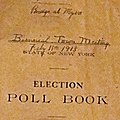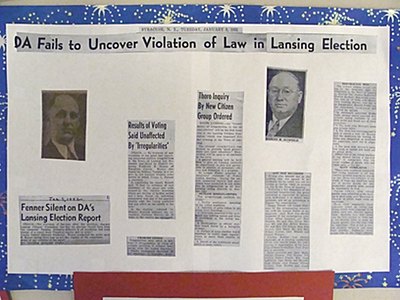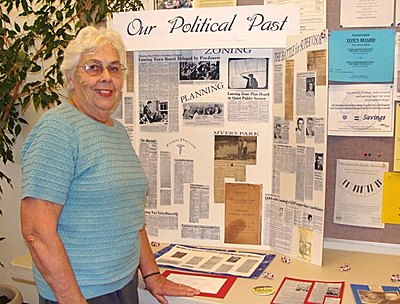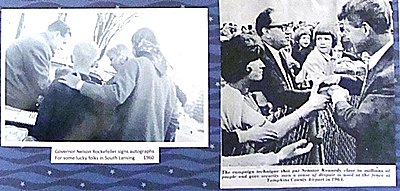- By Dan Veaner
- Around Town
 Print
Print  If you vote at the Lansing Town Hall you'll have a treat on election day next Tuesday. While you are waiting in line to vote you can look back in time into Lansing's political history. The exhibit is called 'Our Political past,' and it will remain on display in the lobby of the Town hall until Thanksgiving. It was put together from the Town historical archives by Fannie Welch with help from Lansing Historian Louise Bement.
If you vote at the Lansing Town Hall you'll have a treat on election day next Tuesday. While you are waiting in line to vote you can look back in time into Lansing's political history. The exhibit is called 'Our Political past,' and it will remain on display in the lobby of the Town hall until Thanksgiving. It was put together from the Town historical archives by Fannie Welch with help from Lansing Historian Louise Bement."After we got done with the dress display I thought we ought to have a political display before the election, Welch says. "We have many, many scrapbooks in the archives."
This year the only Lansing position is uncontested with Katrina Binkewicz running for Town Council. But the political climate was scathing hot in Lansing politics 60 years ago when accusations of voting irregularities were investigated by a citizen's committee in Lansing, as well as Tompkins County District Attorney Frederick Bryant in 1952. Charles Schofield had defeated Cushing Murray for the Supervisor position 445 - 429. Two years earlier Murray had defeated Schofield 591-289.
 DId Schofield steal the election? DA Bryant found no evidence that he did.
DId Schofield steal the election? DA Bryant found no evidence that he did.Accusations included faulty operation of voting machines, improper insertion of the cardboard tabs in the machines that display candidates' names over the correct levers, inelegible votes being counted, election board members who did not qualify to serve, and denial of secret ballots to some voters. But Schofield served the term when Bryant failed to find evidence of wrongdoing.
"We've had battles," she says. "We've even had a tie. It was broken by keeping the one who was already Supervisor."
That was in 1955 when Harris B. Dates first threw his hat in the ring to challenge Russell Lane. Lane had been Supervisor since 1953. But in 1957 Dates challenged Lane again, and this time he won. Lane came back to challenge Dates in 1963, but Dates won by only 15 votes. He defeated lane again in 1965, this time by 260 votes, 893 - 633.
The exhibit also has sections on planning and zoning, hot topics During Charlie Howell's time as Supervisor that eventually led to the incorporation of the Village of Lansing, which howell strongly opposed. Another section documents town justices, and another doctors who practiced in Lansing. Welch also found articles from when Bobby Kennedy visited Tompkins County, and President Eisenhower spoke at Cornell. She also found a picture of Governor Nelson Rockefeller signing autographs at Rogue's Harbor Inn.
 Fannie Welch
Fannie WelchWelch's interest in politics began when she was around eight years old. The way she tells it that's when she was disinterested in politics. Her father Clair McPheeters was a Lansing tax collector for many years, who took her with him as he campaigned from door to door.
"I remember going electioneering with him when I was about ten," she recalls. "I can remember sitting in the car because I didn't want to go in while he talked to all these old people. The choices weren't great: you could sit in the car in the dark or you could go in and listen to the old people!"
 Governor Nelson Rockefeller at Rogue's Harbor Inn in 1960 (left) and Robert Kennedy visits Tompkins County in 1961
Governor Nelson Rockefeller at Rogue's Harbor Inn in 1960 (left) and Robert Kennedy visits Tompkins County in 1961Lansing Democrats choose their candidates in caucuses each year, while Republicans typically rely on primary elections when they have more than one aspiring candidate. But Welch found that Lansing Republicans caucused at least once.
"The Republicans had a caucus in 1971 at the Town Hall, which was in Ludlowville," Welch says. "It was at the foot of Mechanic's Hill (that starts at Ludlowville Park and descends past the site of the old Mill, ending up at a fishing spot on Salmon Creek). It's now an apartment complex, but that was the Town Hall."
Welch says that a list of all registered voters in Tompkins County showed that Lansing had 167 Democrats to more than 500 Republicans in 1930. The Republicans held the majority in the town for years, but today Lansing Democrats are in the majority with 2798 to 2088 Republicans.
"You can't go forward if you don't know what happened in the past," Welch says. "There is so much in our archives."
Welch's first exhibit was on clothes worn in Lansing in the 19th Century, which was on display at the Lansing Community library Gallery last December. That sparked her interest in showing off Lansing's history. She is already planning future exhibits, including one on the history of the Lansing Community Center, a grange hall that also served as a school in 1955. She is also thinking about a local agricultural history display and an exhibit featuring influential Lansing women from the 1930s and '40s.
v8i42



